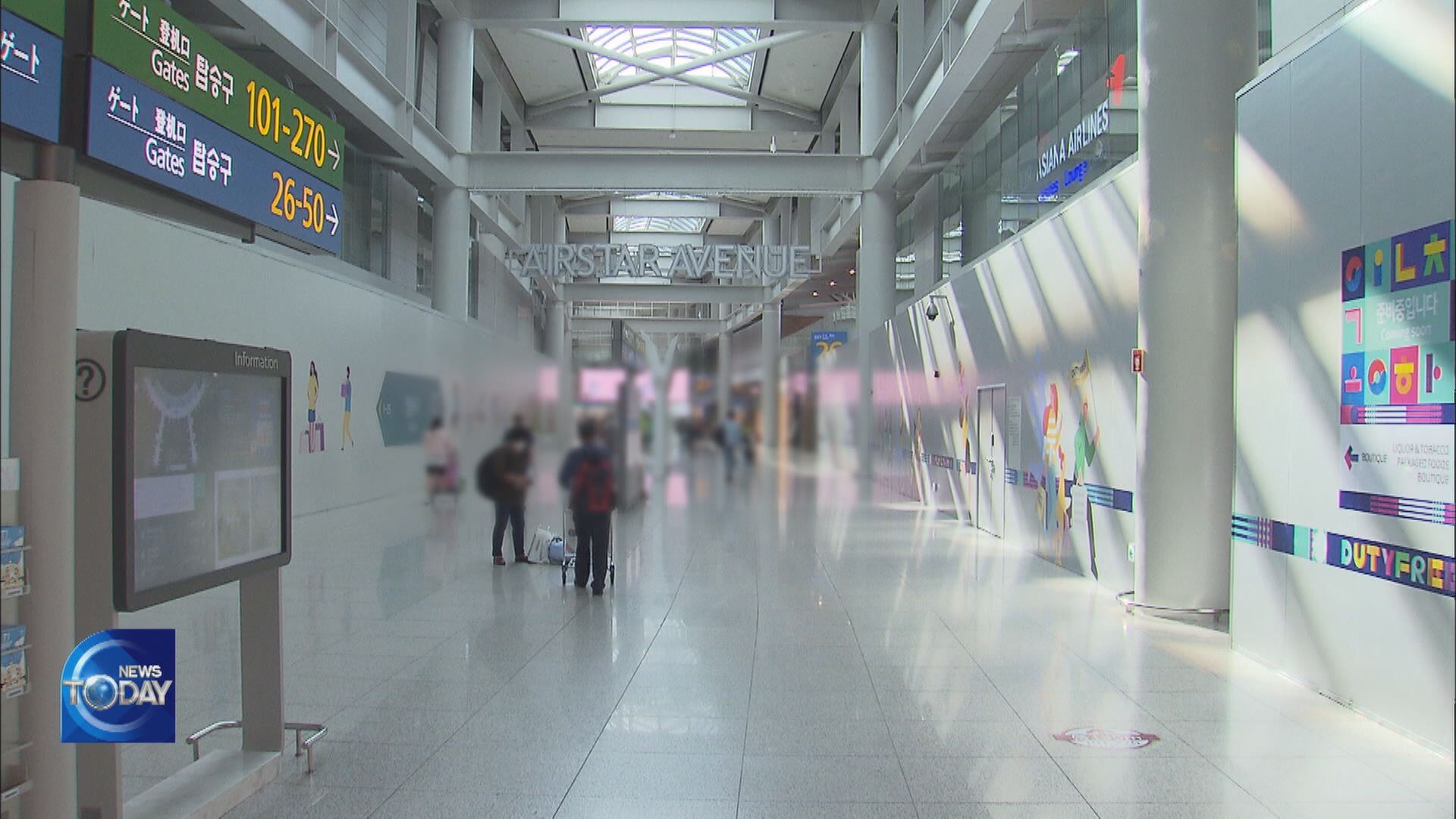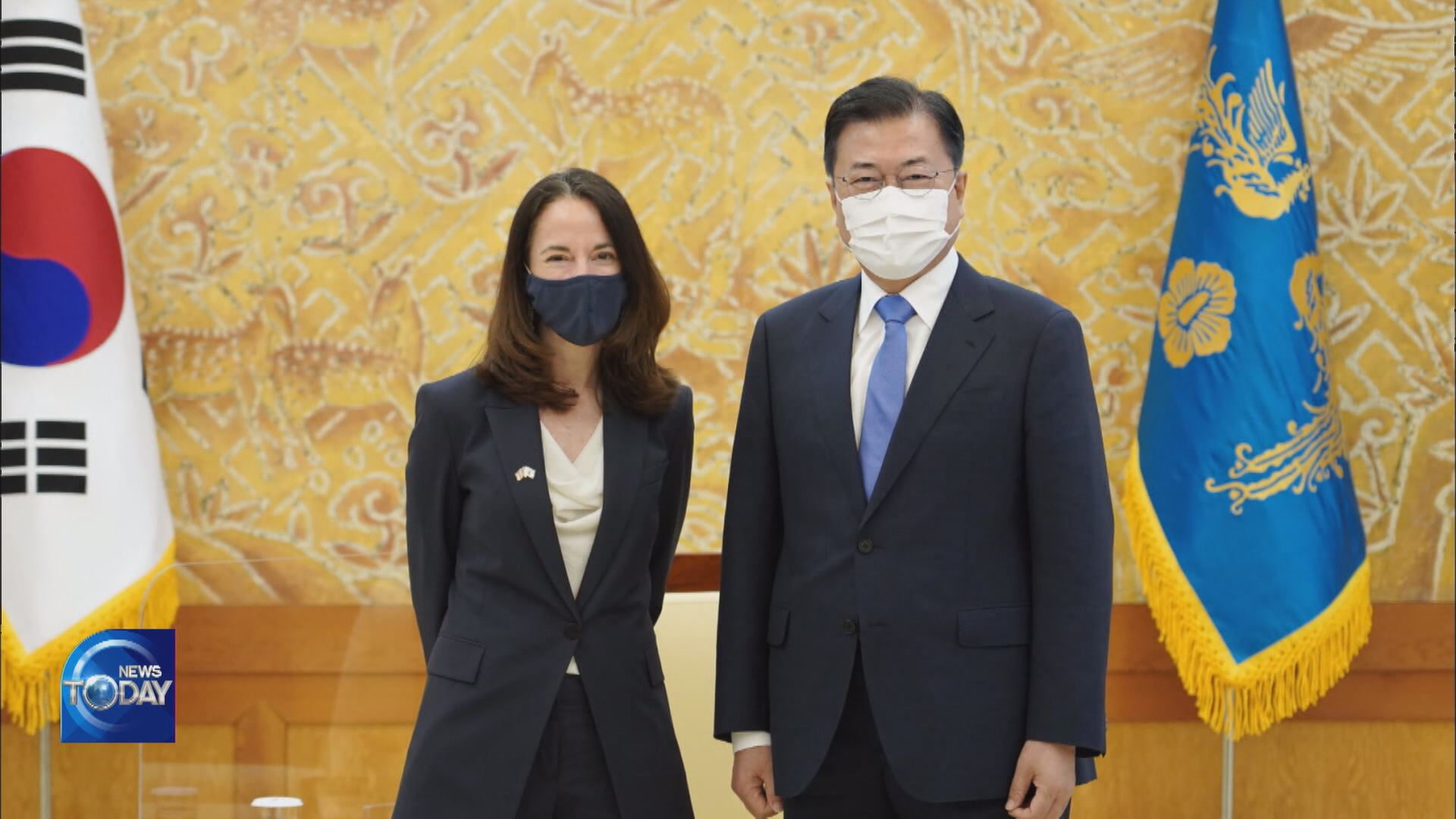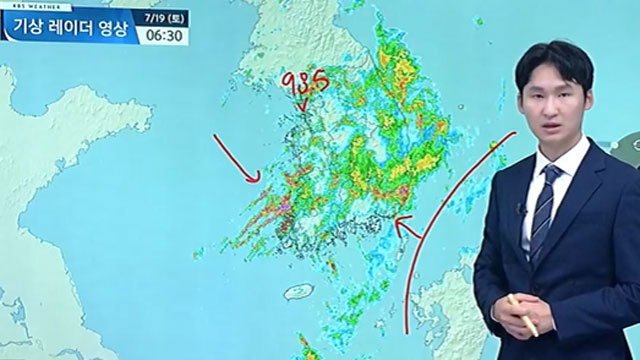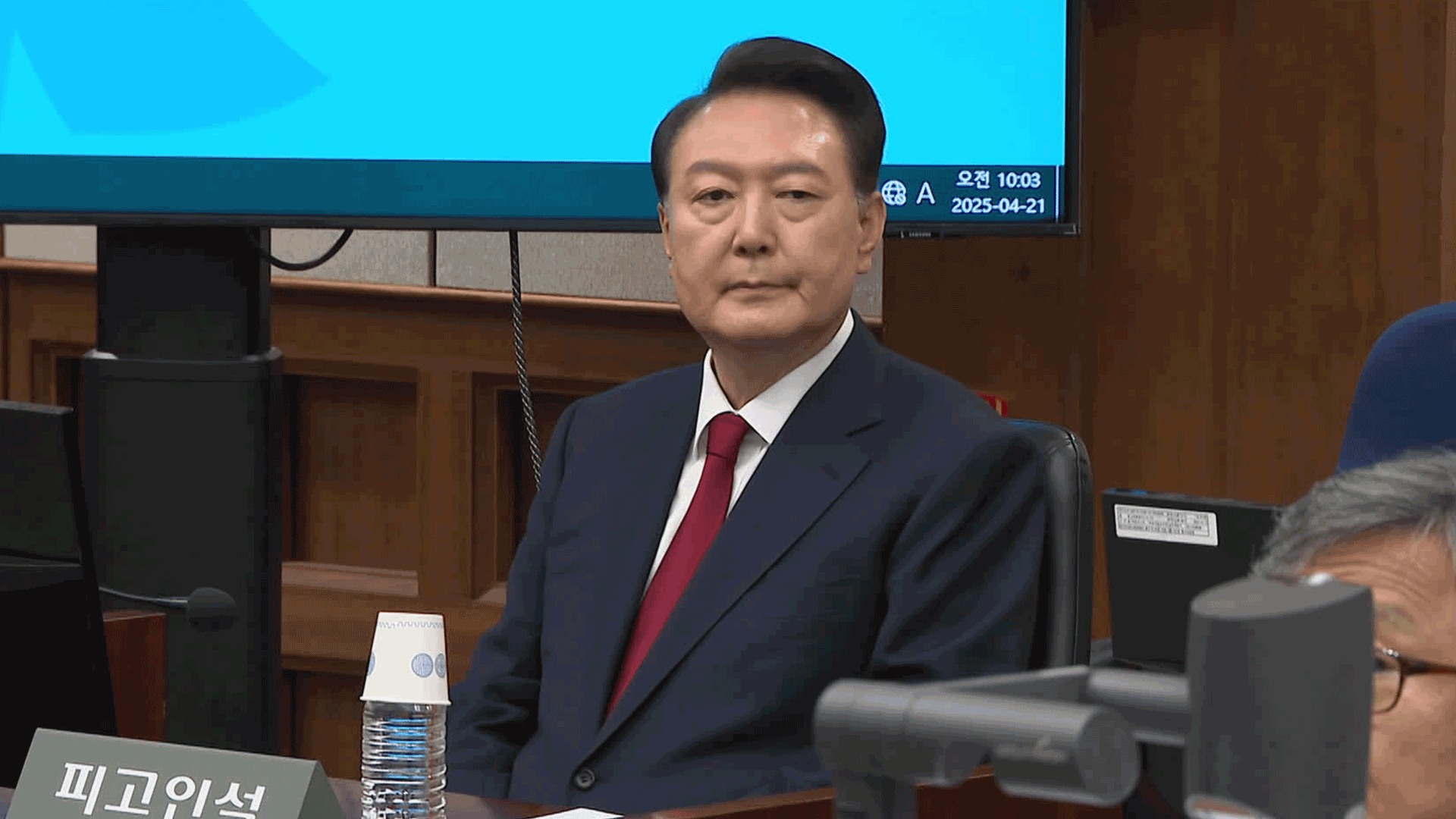CONCERNS OVER DUTY-FREE SHOPS AMID PANDEMIC
입력 2021.10.18 (15:09)
수정 2021.10.18 (16:46)
읽어주기 기능은 크롬기반의
브라우저에서만 사용하실 수 있습니다.
[Anchor Lead]
South Korean airport duty-free operators are struggling amid the prolonged pandemic. In the meantime, the Chinese duty-free industry has been growing fast enough to pose a threat to the South Korean market. There are rising concerns that South Korean duty-free shops could lag behind even when the nation shifts to a “living with COVID-19” strategy.
[Pkg]
Inside the departure hall at Incheon International Airport. Coverings are set up in areas, which used to house duty-free shops. Some stores have their shutters down. Large duty-free operators have pulled out due to the burden of rentals, as travels were brought to a screeching halt by the pandemic. With the shops remaining closed, about two thirds of their employees quit. Customers are rarely seen at stores that are open. For staffers who chose to stick around, the situation is becoming more challenging.
[Soundbite] Kim Tae-sik(Hyundai Dept. Store Duty-free Shop) : "The current sales are far lower than what we expected when opening."
Before the pandemic, airport duty-free shops earned nearly three trillion won in annual sales. But the volume plunged to 600 billion won shortly after the pandemic began. The downward trend continued to drop, reaching the 50 billion won level in the first half of the year.
[Soundbite] Kim Beom-ho(Incheon Int’l Airport Corporation) : "The number of travelers have plummeted to a 20th of the pre-pandemic level. As a result, earnings of duty-free shops and the airport corporation have also dropped by as much."
While South Korean operators are struggling, the Chinese duty-free market is enjoying a steep growth. This is thanks to the Chinese government’s policies to support the duty-free industry. For example, Beijing designated Hainan as a special duty-free zon for domestic customers and raised the purchase limit by more than three times. In terms of sales, China’s state-owned Duty Free Group ranked first worldwide last year.
[Soundbite] Prof., Byun Jeong-woo(KyungHee University) : "It will lead to a fall in sales generated by Chinese travelers who used to shop at South Korean duty-free stores. Also, global brands’ increasing focus on China which will make S. Korean operators fall behind Chinese rivals in terms of the economy of scale."
In order to reduce costs and survive, South Korean duty-free operators are focusing on scaling down their businesses by eliminating overseas branches and opening stores at small provincial airports. It seems necessary for the domestic duty-free industry to come up with strategies to thrive and reclaim the No.1 spot in a post-pandemic world.
South Korean airport duty-free operators are struggling amid the prolonged pandemic. In the meantime, the Chinese duty-free industry has been growing fast enough to pose a threat to the South Korean market. There are rising concerns that South Korean duty-free shops could lag behind even when the nation shifts to a “living with COVID-19” strategy.
[Pkg]
Inside the departure hall at Incheon International Airport. Coverings are set up in areas, which used to house duty-free shops. Some stores have their shutters down. Large duty-free operators have pulled out due to the burden of rentals, as travels were brought to a screeching halt by the pandemic. With the shops remaining closed, about two thirds of their employees quit. Customers are rarely seen at stores that are open. For staffers who chose to stick around, the situation is becoming more challenging.
[Soundbite] Kim Tae-sik(Hyundai Dept. Store Duty-free Shop) : "The current sales are far lower than what we expected when opening."
Before the pandemic, airport duty-free shops earned nearly three trillion won in annual sales. But the volume plunged to 600 billion won shortly after the pandemic began. The downward trend continued to drop, reaching the 50 billion won level in the first half of the year.
[Soundbite] Kim Beom-ho(Incheon Int’l Airport Corporation) : "The number of travelers have plummeted to a 20th of the pre-pandemic level. As a result, earnings of duty-free shops and the airport corporation have also dropped by as much."
While South Korean operators are struggling, the Chinese duty-free market is enjoying a steep growth. This is thanks to the Chinese government’s policies to support the duty-free industry. For example, Beijing designated Hainan as a special duty-free zon for domestic customers and raised the purchase limit by more than three times. In terms of sales, China’s state-owned Duty Free Group ranked first worldwide last year.
[Soundbite] Prof., Byun Jeong-woo(KyungHee University) : "It will lead to a fall in sales generated by Chinese travelers who used to shop at South Korean duty-free stores. Also, global brands’ increasing focus on China which will make S. Korean operators fall behind Chinese rivals in terms of the economy of scale."
In order to reduce costs and survive, South Korean duty-free operators are focusing on scaling down their businesses by eliminating overseas branches and opening stores at small provincial airports. It seems necessary for the domestic duty-free industry to come up with strategies to thrive and reclaim the No.1 spot in a post-pandemic world.
■ 제보하기
▷ 카카오톡 : 'KBS제보' 검색, 채널 추가
▷ 전화 : 02-781-1234, 4444
▷ 이메일 : kbs1234@kbs.co.kr
▷ 유튜브, 네이버, 카카오에서도 KBS뉴스를 구독해주세요!
- CONCERNS OVER DUTY-FREE SHOPS AMID PANDEMIC
-
- 입력 2021-10-18 15:09:23
- 수정2021-10-18 16:46:17

[Anchor Lead]
South Korean airport duty-free operators are struggling amid the prolonged pandemic. In the meantime, the Chinese duty-free industry has been growing fast enough to pose a threat to the South Korean market. There are rising concerns that South Korean duty-free shops could lag behind even when the nation shifts to a “living with COVID-19” strategy.
[Pkg]
Inside the departure hall at Incheon International Airport. Coverings are set up in areas, which used to house duty-free shops. Some stores have their shutters down. Large duty-free operators have pulled out due to the burden of rentals, as travels were brought to a screeching halt by the pandemic. With the shops remaining closed, about two thirds of their employees quit. Customers are rarely seen at stores that are open. For staffers who chose to stick around, the situation is becoming more challenging.
[Soundbite] Kim Tae-sik(Hyundai Dept. Store Duty-free Shop) : "The current sales are far lower than what we expected when opening."
Before the pandemic, airport duty-free shops earned nearly three trillion won in annual sales. But the volume plunged to 600 billion won shortly after the pandemic began. The downward trend continued to drop, reaching the 50 billion won level in the first half of the year.
[Soundbite] Kim Beom-ho(Incheon Int’l Airport Corporation) : "The number of travelers have plummeted to a 20th of the pre-pandemic level. As a result, earnings of duty-free shops and the airport corporation have also dropped by as much."
While South Korean operators are struggling, the Chinese duty-free market is enjoying a steep growth. This is thanks to the Chinese government’s policies to support the duty-free industry. For example, Beijing designated Hainan as a special duty-free zon for domestic customers and raised the purchase limit by more than three times. In terms of sales, China’s state-owned Duty Free Group ranked first worldwide last year.
[Soundbite] Prof., Byun Jeong-woo(KyungHee University) : "It will lead to a fall in sales generated by Chinese travelers who used to shop at South Korean duty-free stores. Also, global brands’ increasing focus on China which will make S. Korean operators fall behind Chinese rivals in terms of the economy of scale."
In order to reduce costs and survive, South Korean duty-free operators are focusing on scaling down their businesses by eliminating overseas branches and opening stores at small provincial airports. It seems necessary for the domestic duty-free industry to come up with strategies to thrive and reclaim the No.1 spot in a post-pandemic world.
South Korean airport duty-free operators are struggling amid the prolonged pandemic. In the meantime, the Chinese duty-free industry has been growing fast enough to pose a threat to the South Korean market. There are rising concerns that South Korean duty-free shops could lag behind even when the nation shifts to a “living with COVID-19” strategy.
[Pkg]
Inside the departure hall at Incheon International Airport. Coverings are set up in areas, which used to house duty-free shops. Some stores have their shutters down. Large duty-free operators have pulled out due to the burden of rentals, as travels were brought to a screeching halt by the pandemic. With the shops remaining closed, about two thirds of their employees quit. Customers are rarely seen at stores that are open. For staffers who chose to stick around, the situation is becoming more challenging.
[Soundbite] Kim Tae-sik(Hyundai Dept. Store Duty-free Shop) : "The current sales are far lower than what we expected when opening."
Before the pandemic, airport duty-free shops earned nearly three trillion won in annual sales. But the volume plunged to 600 billion won shortly after the pandemic began. The downward trend continued to drop, reaching the 50 billion won level in the first half of the year.
[Soundbite] Kim Beom-ho(Incheon Int’l Airport Corporation) : "The number of travelers have plummeted to a 20th of the pre-pandemic level. As a result, earnings of duty-free shops and the airport corporation have also dropped by as much."
While South Korean operators are struggling, the Chinese duty-free market is enjoying a steep growth. This is thanks to the Chinese government’s policies to support the duty-free industry. For example, Beijing designated Hainan as a special duty-free zon for domestic customers and raised the purchase limit by more than three times. In terms of sales, China’s state-owned Duty Free Group ranked first worldwide last year.
[Soundbite] Prof., Byun Jeong-woo(KyungHee University) : "It will lead to a fall in sales generated by Chinese travelers who used to shop at South Korean duty-free stores. Also, global brands’ increasing focus on China which will make S. Korean operators fall behind Chinese rivals in terms of the economy of scale."
In order to reduce costs and survive, South Korean duty-free operators are focusing on scaling down their businesses by eliminating overseas branches and opening stores at small provincial airports. It seems necessary for the domestic duty-free industry to come up with strategies to thrive and reclaim the No.1 spot in a post-pandemic world.
이 기사가 좋으셨다면
-
좋아요
0
-
응원해요
0
-
후속 원해요
0

















이 기사에 대한 의견을 남겨주세요.